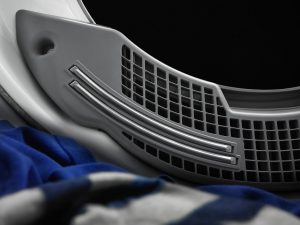How Cleaning Your Dryer Lint Filter Could Save You Money

The lint filter inside your dryer is a small component that is very easy to overlook, but it could actually help you achieve some significant time and money savings. Cleaning your lint filter is a simple task, but regular cleaning is vital for an efficient home.
The Potential Problems of Having a Dirty Lint Filter
While it is easy to overlook, your filter can have a significant impact on dryer performance. If your filter is allowed to become clogged with lint and debris, it can create some potential problems including:
- Blocked Airflow: The lint or fluffy residue from your towels, bedding, and clothing accumulates inside the dryer and collects in the filter. Unfortunately, this lint doesn’t just disappear, and when the filter becomes full, it restricts airflow, blocking the heated air. This lack of free flowing air means that not only will your clothing and other items take longer to dry, but there is also a risk of your dryer overheating.
- Increased Energy Usage: Additionally, the restricted airflow will contribute to using more energy to dry your items. As your dryer is forced to work harder and harder, it will use more and more energy, so you’ll be faced with higher energy bills.
- Motor Strain: The additional power needed and longer drying periods not only uses more energy, but places the dryer components under increasing strain. One component, particularly at risk, is the dryer motor. As your dryer is working harder, you may find that your dryer motor is vulnerable to repair issues and may suffer from a compromised lifespan. This means that with prolonged use, your motor is likely to fail and you’ll need to pay out for a potentially costly repair bill.
- Fire Hazard: When the lint filter is not cleaned, the lint will continue to accumulate. Since it cannot be collected in a full filter, it will start to gather around it, under it and in other corners of your appliance. This can create a fire hazard should your dryer start to malfunction or overheats. This can not only create a potentially costly issue, but it could also put your family and home at risk.
How to Locate Your Lint Filter Trap
Each dryer model is built in a slightly different way, and different manufacturers tend to favor different locations for the lint filter trap. Some dryers have easily accessible filters, but others have filters that are more hidden from view. The details of the lint filter for your dryer will be shown in your owner’s manual, but there are some common possible locations. These include:
- On the Back Wall: If you open your dryer door, you will need to look at the back wall of the dryer. You should be able to notice an oblong cut out panel with holes in. Grip the panel with a finger and thumb into two of the holes and pull to release the lint filter trap from the wall. You may need to squeeze the sides to allow the trap to open it to access the lint and clean it out.
- Inside the Door: Open up the dryer and look just inside the door. You may notice a small raised handle that can be pulled to remove the trap from the lint filter slot. You may also notice a screen shaped like the shallow channel in the door cavity that can allow you to scoop any lint out with your finger.
- Corner of the Dryer: Look at the top corner of your dryer near where the control panel is located. You should be able to see a handle that will allow you to pull the lint screen from a shaped channel.
Wherever the lint filter is located, cleaning it should be a priority. So, be sure to clean the filter before every load to keep your dryer operating properly and efficiently.
If your dryer is struggling to cope with your laundry needs, it may be time to upgrade, and you can explore your options with this collection of laundry appliances, or speak to a home appliance expert for help and guidance.
- How to Design a Year-Round Outdoor Kitchen in Southern California
- What Are Flush-Mount Appliances: Flush-Mount Appliances Explained
- What Appliance Brands Hold Their Value the Longest
- Designing the Ultimate Outdoor Bar: Must-Have Appliances for Year-Round Fun
- Luxury Refrigerator Guide 2025: Built-In vs. Freestanding and What to Know Before You Buy
- How Smart Appliances Are Changing Luxury Kitchen Design in 2025
- The Ultimate Outdoor Grill Guide for 2025: Built-In vs. Freestanding
- Smart Bathroom Faucets & Fixtures in 2025: Blending Technology with Luxury Design
- Built-In Coffee Machines: Are They Worth It for Your Kitchen in 2025?
- How to Choose the Right Dishwasher for Your Home: Noise, Capacity, and Features Explained






